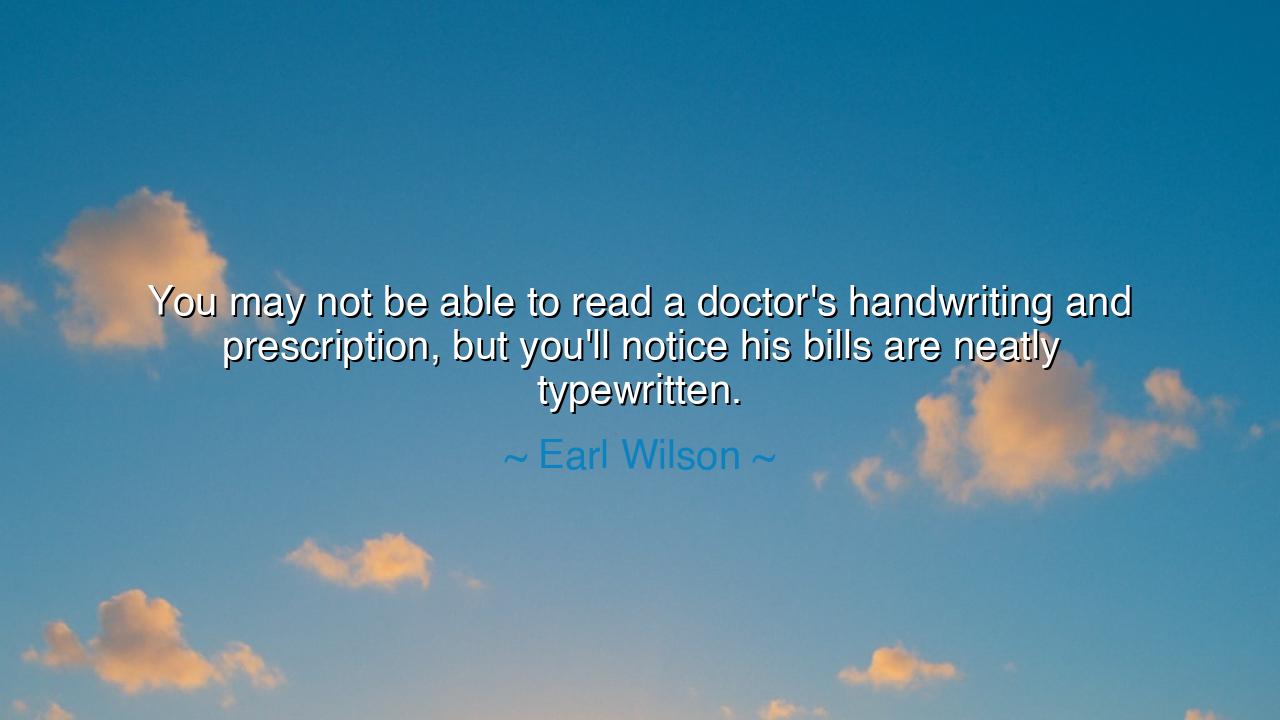
You may not be able to read a doctor's handwriting and
You may not be able to read a doctor's handwriting and prescription, but you'll notice his bills are neatly typewritten.






The words of Earl Wilson—“You may not be able to read a doctor’s handwriting and prescription, but you’ll notice his bills are neatly typewritten.”—arrive first as jest, but like the best humor, they reveal a deeper truth. Beneath the laughter lies a sharp reflection on human priorities, the tension between service and profit, and the way clarity is reserved for that which benefits the giver, not the one in need. It is a reminder that while healing should be sacred, worldly gain often intrudes, shaping even the noble profession of medicine.
The ancients, too, knew this paradox. In the temples of healing dedicated to Asclepius in Greece, physicians were sworn to tend the suffering without avarice. Hippocrates, in his oath, commanded that the healer remember the good of the patient before the profit of the self. Yet even in those times, complaints were raised of physicians who prized coin above compassion. Wilson’s words, spoken in wit, are an echo of this ancient caution: that the clarity of the bill often overshadows the confusion of the cure.
History offers us the story of Molière, the French playwright, who satirized doctors in his comedies. He mocked their obscure language, their endless prescriptions, and their fondness for fees. In The Imaginary Invalid, Molière portrays a physician more skilled in presenting his charges than in healing his patient. The audience laughed, but their laughter carried a sting, for it reflected a real suspicion: that medicine, for all its learning, was too often more concerned with its accounts than its compassion. Wilson, centuries later, sharpens the same point—when the prescription is unreadable, the bill still speaks with perfect clarity.
Yet we must not take this merely as an accusation against physicians. It is also a mirror held up to all human dealings. How often do men and women veil their service in confusion, yet render their demands for reward in crystal clarity? The worker who labors half-heartedly yet never forgets his pay, the ruler who speaks in riddles but is exact in taxation, the merchant who obfuscates the quality of his goods yet presents his prices plainly—all are guilty of the same imbalance. The quote reminds us that where the heart is, there clarity will dwell.
But wisdom also beckons us to look deeper still. For Wilson’s humor points not only to greed, but to the need for balance between service and reward. A physician has every right to be paid for his labor, just as any worker does. The fault lies not in the existence of the bill, but in the lack of equal clarity in the service provided. When the care itself is shrouded in mystery while the charge is plain, trust falters, and morality suffers. Thus the teaching is not against payment, but against imbalance, against placing profit in brighter ink than compassion.
The lesson, then, is clear: in all our labors, let our service be written as plainly as our rewards. Let the prescription of our duty be as legible as the bill of our gain. If we demand clarity when receiving, we must offer clarity when giving. The ancients called this justice: to render to each their due, and to do so openly, without concealment.
Therefore, let each person act. If you are a healer, let your compassion be as clear as your fee. If you are a leader, let your duty shine as bright as your authority. If you are a worker, let your labor be as honest as your wage. For in this way, laughter at hypocrisy will be silenced, and trust will be restored. Earl Wilson’s jest is thus more than humor; it is a call to integrity, reminding us that true honor lies in serving with the same clarity with which we seek to be rewarded.






AAdministratorAdministrator
Welcome, honored guests. Please leave a comment, we will respond soon